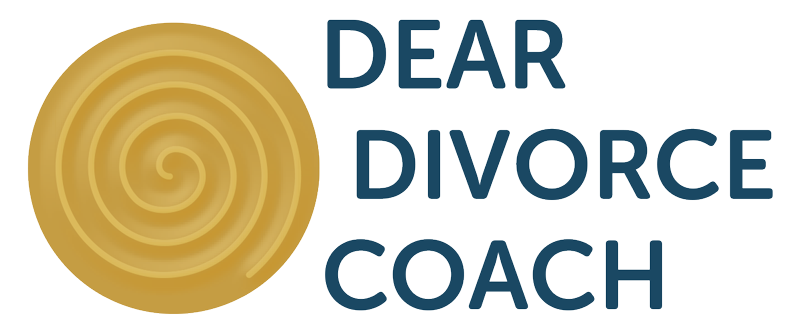Dear Divorce Coach:
I am ready to end my marriage. We have two children, teens still, and my husband and I live separate lives except for our interaction around them. I think we can do okay separately, financially and even when co-parenting, but he says he will fight me “tooth and nail” unless I agree to everything he thinks is fair. He says I’m the one who wants the divorce so he should be able to decide the rest. I really want to do a good job together for the kids but also know I will strongly resent him if he takes advantage of any financial or co-parent plan because I’m the one who wants the divorce. What should I do?
– Unconsciously Uncoupling

Dear Unconsciously Uncoupling,
I’m so glad to discuss what sounds like a new trend but is really just an updated version of what can be a cooperative parting of the ways. The term was surely made trendy when Gwyneth Paltrow and Chris Martin announced their separation in 2014 as conscious uncoupling and there is an article on Goop’s website that talks about the intention behind the process, but let’s spend some time here unpacking what it is and why it may or may not work for the end of your marriage; the short answer is this approach may work for you if you’re willing to put in some work.
What is Conscious Uncoupling?
The ideas behind conscious uncoupling are really fundamental: getting to a place of agreement in a way that preserves respect, dignity, co-parenting (if relevant) and doesn’t seek to destroy the former partner emotionally or financially.
The term was originally coined by Katherine Woodward Thomas in 2009 as part of a five-step program in which she emphasized that a couple’s separation and divorce could be achieved through a purposeful respect of each other through the entire process. You may think you both have to be at that amicable state when you start, but the reality is the concept works most often for people who are struggling with this breakup. It acknowledges that break-ups are really difficult and sometimes devastating, but can provide you with a path through to the other side; one that doesn’t cause further damage to yourself or your former partner.
Approaching your divorce with kind and gracious intention enables you to move forward from the hurt and hostility that may have been your go-to form of communication for years before you decided to separate. But this process is more than just “playing nice” in your divorce; you will likely spend substantial time on YOU. It allows you to self-reflect, regroup, and begin to heal as you move into the next phase of your life and your relationship. You’ll work on resolving your emotions, communicating with honesty and respect, and setting yourself up for future love to come into your life.
What could be better than this, really?
Conscious uncoupling is a form of mediation
It has existed, already, for a long time in many forms and is most in line with the kind of mediation I believe is most impactful: transformative mediation. In this version, we give each participant the opportunity to be heard even when full agreement doesn’t occur. It may take time to get to a place where this may occur and I personally think it’s best to have a coach, whether someone who is legally or therapeutically trained, who can support both participants in the process.
Through this mediation, you and your partner will define your challenges and issues and work to identify resolutions on your own. Then, you will take time to hear and acknowledge your partner’s perspective. You will listen and seek to understand how they define the problem and how they arrived at the solution they’ve determined. I must emphasize that this does not mean either of you have to agree with the other’s point of view. Rather, just like conscious uncoupling, it lays the groundwork for an amicable, respectful separation. The key, though, is that you and your ex are responsible for the end result.
As you become familiar with this approach, you will see that you can navigate most forms of conflict with a stronger, more defined point of view and a way to communicate that view through open and respectful dialogue.
Lawyers can be involved, in the background, too, but don’t need to be a part of all of the sessions the couple has to discuss what they believe to be true, what is next and what is best for themselves and/or their children. Sometimes, the discussion needs to happen before the lawyers create the agreement. In fact, it should, in my professional experience.
It’s important to note that this doesn’t mean legal advice isn’t given all along the way. It can be part of the background of the process so everyone is clear about what the law of their jurisdiction may do if no agreement is achieved. It certainly gives everyone a good idea about the outer limits of reasonable agreement so that unrealistic expectations can be discarded.
Is conscious uncoupling the right approach for you and your former partner (who may not be ready or on-board)?
The problem that can arise is when one partner is so committed to the idea of conscious uncoupling, or a transformative process, they discard their own views and needs. It may seem improbable but sometimes my clients find themselves so full of shame, trauma or actively seeking avoidance of conflict, they cannot imagine asserting their own needs. Sometimes they are so “done” with the marriage, I have seen them agree to almost anything to get out. This isn’t either conscious or transformative. It may look good to outsiders as they’re just cutting ties as quickly as possible, but they know nothing about the inner workings of the marriage. And the result of this type of divorce approach can be economically and emotionally disastrous for the participants and their children. It does not set either party up for successful communication in the future when co-parenting. It also never addresses the core of their issues and can heavily impact future relationships.
When I see clients who want to consider this approach in their separation or divorce, I often screen them with questions to assess their willingness to participate in this type of mediation, but also to understand whether they’re likely to assert themselves. I emphasize that conscious uncoupling and transformative mediation are really all about showing up authentically and fully so that the process is enriched by two human beings (and their children) for an outcome that is functional, respectful and ultimately mutually beneficial. It doesn’t need to “look like” anyone else’s divorce but it does need to serve them. That’s why I try to be certain an individual or couple I work with is ready for this process. If they are not, I sometimes recommend they seek therapeutic support to learn boundaries and understand the wounds that may not allow them to show up for themselves in a way that serves them in divorce.
If an individual or couple can show up with some equity in their approach with each other, it’s a good place to start. We can still talk about points of disagreement, and we should, but we need to know each partner has a voice that they are willing to use otherwise those old feelings of hurt and resentment may start to emerge.
So, what questions should you explore, perhaps with coaching support to provide the right tools and framework, to be sure a transformative process may work for you:
- Can I speak up for myself when I disagree with my spouse?
- Does one of us have total control of the finances and can this shift?
- Do I know how I want things to look for our children and am I able to share that with my spouse?
- Although I may feel emotional, am I thinking carefully about my own future and thinking about necessary legal and financial planning?
If you cannot be clear that you are able to do these specific things, it may not yet be time for a transformative model for your divorce. I do though recommend you do the therapeutic and/or coaching work and you may still get there. This approach is the most successful for ending a marriage as smoothly as possible and if you’re co-parenting, for defining a healthy and amicable future relationship.
So take some time to think about how you and your soon-to-be-ex would handle this type of divorce. And if you’re able, gauge his interest in conscious uncoupling; see if he understands the benefits and is willing to take that first step. Be thoughtful, plan ahead and be sure your voice is heard.
You can consciously uncouple, or use transformative mediation as a tool in the end of your relationship even if he’s not fully on-board. It takes a commitment to listening as well as talking and sometimes flexibility in the face of resistance too. It isn’t a one-size-fits-all process and it requires both people to show up authentically. The end benefit though is that you can shift from an intimate partner relationship that became broken to at the very least two people parting ways with mutual respect and no animosity or hostility.
I wish you all the best as you navigate the best process for you and your family.
